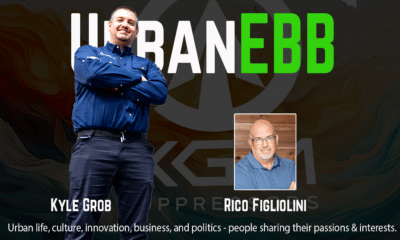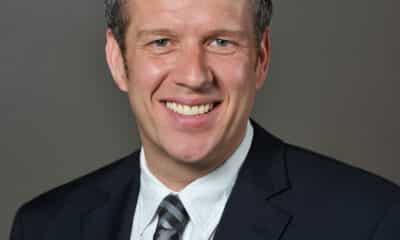City Government
New ARPA Grants Start-Up, AV Shuttles Return to Tech Park, and Other City News
Published
3 years agoon
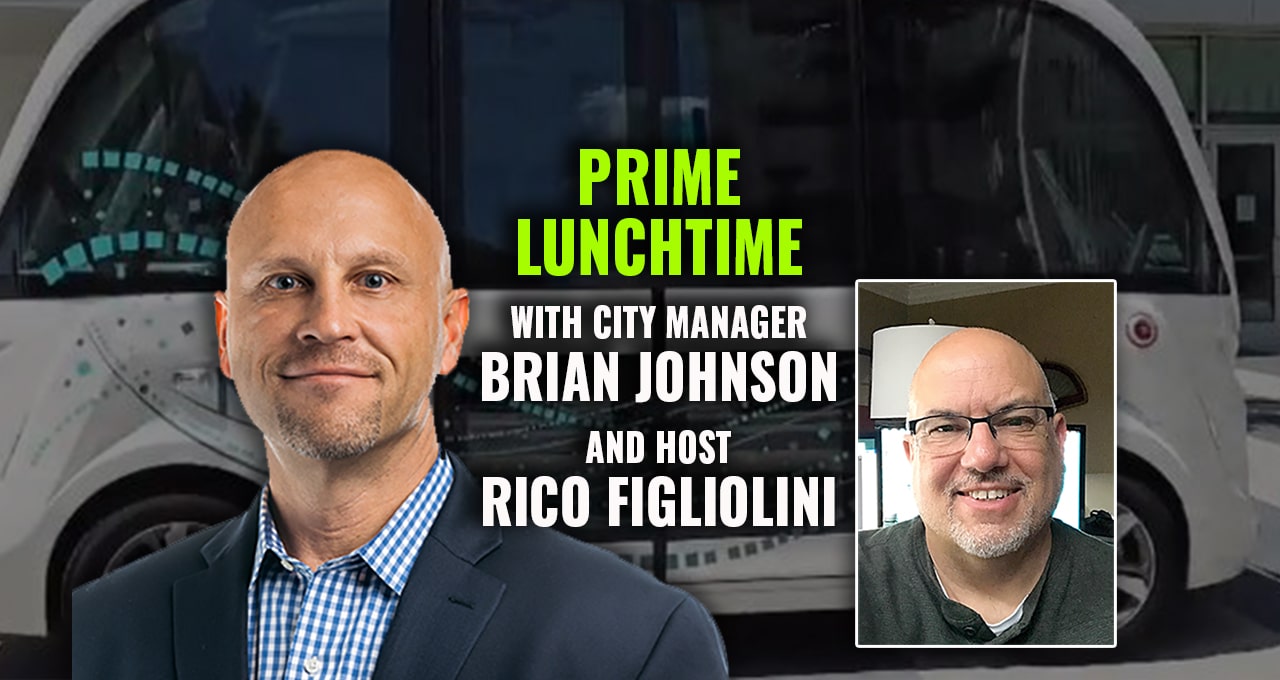
Fresh from giving a keynote speech at this year’s Move America 2021 (Mobility Conference), we speak with City Manager Brian Johnson about the new AV shuttles in Technology Park – the first time TWO different autonomous vehicles will be operated in the same environment).) Plus, we talk about the ARPA grants that just launched and more city news.
Timestamp (where to find it in the show):
[00:00:30] – Intro
[00:02:01] – Autonomous Shuttles in Technology Park
[00:10:54] – ARPA Grants
[00:17:43] – New Interests in Curiosity Labs
[00:21:41] – Spalding Drive Expansion
[00:23:04] – Other Building Projects and Expansions
[00:30:48] – Closing
“Whether we like it or not, if we don’t carefully allow ourselves to grow, we don’t want to do it haphazardly. But if we don’t grow or allow the demand to come into the city, then the surrounding cities will pass us by. Population in Metro Atlanta is growing. They need to go somewhere and they’re looking at places. And we’re in a good position. We’re close to inside the perimeter, but not quite that dense yet. And so maybe we do offer a good intermediate step. We’re not North Forsyth county, but we’re not down in Midtown either.”
Brian johnson
Podcast Transcript
[00:00:30] Rico: Hi everyone. This is Rico Figliolini, host of Peachtree Corners Life and today Prime Lunchtime with The City Manager. I’m going to bring Brian on shortly. We’re going to be talking about quite a few things. The AV shuttles that have returned to Technology Park. ARPA grants that are in the process right now of application acceptance and a few other things as well. But just want to let you know that Brian being the city manager of Peachtree Corners has been out again, as he often is, doing speeches and giving keynote addresses, conferences that help attract more businesses to the city of Peachtree Corners. So we’re fortunate to have him coming from the airport parking lot as he’s come in from giving a keynote speech, Hey Brian, at Move America, which is a mobility conference held in Las Vegas. And not only did he do the keynote speech there, but he ended up having to be there for another hour and a half handing out business cards to a line of people that showed up, wanting to know more about the city of Peachtree Corners. So how’re you doing Brian? And thank you by the way for coming from right off the plane onto the show. I appreciate that. So let’s get right into it. There’s a few things that we want to talk about and there might be a slight delay, it seems. But we’ll work through that. But our first thing would be about the AV shuttles that returned to the Peachtree Corners and Technology Park Line. So tell us a little bit about that, Brian, about the two companies, Local Motors, Navya, which is a French company. So tell us a little bit about what that means of what actually is happening there. This started, I think last week, right?
[00:02:01] Brian: It has and again, I appreciate this opportunity Rico. I do apologize. I’m not in my normal environment, if you will. I just flew in from speaking at a conference, a mobility conference, and what you just brought up was the topic at the conference. And that is we are on, this coming Wednesday are going to be unveiling the deployment of our second round of autonomous vehicles. This time, as opposed to the first we’re going to do a couple of things differently. In fact, different enough that I can say that this is going to be the first time in the world, that there is going to be a deployment of autonomous vehicles from two different OEMs or original equipment manufacturers. Like you said earlier, one is Local Motors, they make the Olli shuttle and they deployed two of theirs a year ago. And they’re coming back with their 2.0 version and another company, a French company called Navya, and they are going to deploy two as well. So we’re going to have four autonomous shuttles. And for the first time in the world, there are going to be two autonomous shuttles from two different OEMs deployed on the same public road at the same time across the 5G wireless network. And so they’re going to be testing connected vehicle services and capabilities for these two OEMs and the four shuttles to test their ability to communicate to each other. So one driverless vehicle to another, across two different companies. As well as communicating to human driven automobiles on the roadway. And there was a lot of interest in how well they perform. And then another important thing is as they do it in a living laboratory environment, these shuttles are open to the public. So people are going to be able to ride on these shuttles just like they did the first time. But in this case, it’s two different ones. And in some cases they may even be doing what’s called platooning, which is the lead shuttle is using its capabilities to move forward. Using its LIDAR to see, using the map that’s put into it’s central processing unit, using its sensors. But then the trail vehicle, it’s going to take all of its directions if you will, from the lead vehicle. And so it’s really just going to keep its distance on the lead vehicle the whole time. But anyway, we can talk about all the unique stuff that’s going to happen, but it is our second deployment. And the last thing I’ll leave you is if, you know, as a resident, I could sit here and say what’s in it for us? It’s not going to be coming into my neighborhood or I’ll never be using it for functional reasons. Maybe I’ll do it as more curiosity play and I want to see what it’s like. But what is happening here is these shuttles and the deployment bring with them teams, support teams, that are here to both keep the shuttles running and to manage all the testing that’s being done. And these people have to stay in hotels. They’ve got to eat. They’re going to probably purchase things. Beyond that these shuttles are here for a year. And so these shuttles are generating activity that our community will benefit from by their mere presence here.
[00:05:43] Rico: Yeah. That’s exciting. That’s exciting because I think not only that, like you described, but all these companies put out their own press releases, right? And they’re pushing the fact that they’re in Peachtree Corners doing this, as well. So that’s exciting because they’re expanding the influence of what we do here. And hopefully other companies will then pay attention to what they’re doing. And maybe look at us and give us a second look or a third look for that matter to see what we’re doing. So that’s why, to me, that’s exciting. And the fact that autonomous vehicles? Yes. You hear things about what’s going on with Tesla right now and self-driving cars, but this is a lot different, really. This is more talking about city mobility, about the functions of what a city can do eventually in providing shuttles to its residents. So a lot different than doing random driving. So this sounds like this would come sooner to me and good stuff, right?
[00:06:40] Brian: Yes. And one other thing to consider is part of this deployment is going to afford the city an opportunity, since there’s more shuttles and more support staff, for us to explore the ability to maybe link up the two hotels that are at the south end of Curiosity Lab’s track. The Marriott and the Hilton specifically, but there’s a bunch of other hotels around it. And link it up with our town center. And we might be able to do it in such a way that people can go between the two and not actually do so on our road, or actually on existing road. And why that’s important is twofold. With Intuitive announcing their $600 million campus and expansion, they are estimating 16,000 hotel room nights stays per year in visiting surgeons that will be learning how to operate using the DaVinci device. And they’re doing that here at our campus. So they’re going to be staying in hotels. And two is, it allows people for whatever reason that might be in that hotel or any of those hotels, to be able to get up to the Town Center and not have to actually be in a vehicle that’s on the roadway, like 141. Right now, if you wanted to go up there, yeah, you’d have to get a cab and the cab would, or whatever would get on 141 and would be contributing to the congestion. We might be able to keep those people off of it, let them go up there. And so it is affording us an opportunity as the municipality to look at functional ways that it can benefit our residents.
[00:08:23] Rico: Yeah. And part of it, I think when we had discussed this once before, we would be using part of the wide pavement area that’s already currently running along Peachtree Parkway. But the city would probably have to expand that a little bit further towards Norcross High School. So then it would be workable that way. But that you don’t have to deal with the state.
[00:08:43] Brian: No, I mean, we have to deal with the state because it’s in their right of way. And we currently are talking to them and they are very interested. But they’re interested because, ‘A’, they know that at some point there’s going to need to be autonomous vehicles in their right of way. And so they want to break the seal on that. Why they like using that extra wide path that you see there on the, I guess that would be what? The East Side of Peachtree Parkway, is because it allows us to put an autonomous vehicle in state right of way, but not in the current traveling. That’s what makes them super uncomfortable. This would allow them to break the seal, but to do so in a way that they’re not like, oh wait, there’s a lot of cars and they’ve got interacts. They’re very interested. And we have high hopes that we’re going to be able to make this happen.
[00:09:35] Rico: That’s cool, that’s great. And I would think the state would love that because you’re right. It just seems much easier to be able to deal with that than trying to put autonomous vehicles right on the road, per se, and still be able to say Georgia might be the first state allowing that. Being able to do that because I don’t know what other state is doing that right now actually. There may not be any. So all good things. A smart city needs to move along and be able to do things like that. And we’ve just come off a successful, we’re attracting a lot of different things. The city’s doing a lot. The Peachtree Corners Festival just happened. That had a great turnout at town center. There’s going to be a first city event. The Peachtree corners decathlon happening, that’s a city sponsored event in November. A lot of good events happening, great breweries out there. We have our own microbrews. Two of them in the city of Peachtree Corners. We just did a podcast with them. So there’s a lot of stuff here, a lot of things happening, technology driven and stuff. So all good things even during this pandemic. There’s a lot of things. So let’s segue a little bit into also what may be helping because of what’s going on the ARPA grants that are out there and actually in the middle of accepting applications. So maybe you could tell us a little bit about where that’s coming from, what those grants are and who can apply for that.
[00:10:54] Brian: ARPA, as the acronym is being called is the American Rescue Plan Act. It is the legislation adopted by US Congress, signed by the president, to appropriate money to states, counties, cities. For us to essentially pump money back into the economies of these jurisdictions and help and do so by helping those companies, for-profit, non-profit. But helping them deal with pandemic related costs or loss of revenue. So it’s money that we’re getting, or we’ve started to receive, for use in helping organizations deal with the effects of the pandemic. And so we may be one of the first, at least in Metro Atlanta, who has formalized a program and a process for this money to get into the hands of these organizations that have been affected by the pandemic. And the reason that we moved as quick as we did, although I will say, quick, but yet methodical. We had some outside help with some consultants who do grant writing and administration for a living. And they helped us formalize this program. But mayor and council’s guidance to me was get this into the hands of those in Peachtree Corners that need it as soon as you can. Because the assumption is these organizations are hurting the most today that they will going forward. Meaning they’re going to be hurting a little bit more today than tomorrow, and then a little bit less the next day and the next day, hopefully as the economy continues to improve. But their direction was, get this into the hands of those who are hurting as quick as you can. So we published the program and we can talk about it more detailed. But it is open and we are appropriating, or we have about $8.2 million that are going to be going out to various organizations that qualify.
[00:13:24] Rico: And as far as qualify, what type of organizations are we seeing coming in or should be coming in to take advantage of this?
[00:13:31] Brian: We have really, there’s no limitation on what type of organizations. You can be a for-profit, you can be a nonprofit, you can even be a governmental entity, technically. But it’s not the type of organization that guides it. It’s the ultimate I guess, use of the money that guides it. So for instance, some of the easy things to qualify would be loss of revenue. A company generally was generating a certain amount of revenue prior to the pandemic it. They’re not generating the same. This money can be used to supplement their revenue stream based on previous earnings. And so to qualify, they would come into the city and show us how much money they generally would make and how it decreased because of the pandemic and then money can go to them and they can just, re-energize their coffers, if you will. That’s an easy one. There’s some other ones, other uses. And by the way, that operation issue with the pandemic, like revenue can be for profit or non-profit. We don’t differentiate between the two in that both of them can qualify. If they can show us that they have lost revenue because of the pandemic. And then you get into expenses. There are expenses that companies have gone into because of the pandemic. Easy examples would be capital improvements made to address the fact that we have an airborne virus. So there could have been structural changes that somebody made to their office. There could have been technology they purchased so that their employees can work from home, things like that, that are pandemic related. And then there could be deferred maitenance. There could be building maintenance that they normally would have done, but they couldn’t because the pandemic affected their revenue streams or they closed completely. There are industries like hotels that have been decimated by the pandemic and they, in some cases closed their doors completely. And so there’s that. And then you get into those groups that have been affected more than others. So there is money that out there that can go to population groups that are underserved, that may have been disproportionately affected by the pandemic. And so if you can have an expense that might help those who were affected in that way, that can also qualify. So there’s a lot of different things, different activities, different uses of the money. They do need to all fall under the pandemic. And whether it’s loss of revenue, increased expenses, groups disproportionally affected, but it’s all pandemic related. And so that would be how we’re getting the applications. But we are getting applications from all sorts of for-profit, nonprofit, oriented organizations
[00:16:26] Rico: It’s good to see that the federal monies are put into local hands, to be able to help put this out get it to the right people. So I’m glad the city’s being able to do that probably way before some of these other cities are able to get their act together.
[00:16:41] Brian: Well, I was going to say, I mean, so the money has to be spent by 2024. So there are a lot of cities that are sitting back and they’re like we don’t know. We’re not going to, we’re going to wait and see on X, Y, or Z. I just know that it here, again, mayor and council felt like, look now is not the time to hoard the money. Because people are hurting the most now, or at least we hope it’s only going to get better every day into the future we go. So again, their guidance to me was get it into their hands. And so we are. And we’re doing it in a way that can be as defensible when the city gets audited. And so that’s where the application comes in to show for us to be able to validate that this money is going to be used to meet the legislative intent Congress had when it wrote it. And our job is to get it into those people’s hands as quick as we can. And we are. You know, finance department led by Cory Sally and some consultants are a million miles an hour right now, grading applications and trying to get that money passed through to those in need.
[00:17:43] Rico: Yeah. That’s great that the city’s doing that. I mean, I look at and they hear about the billion dollars or so, I forget the amount of money, that’s supposed to be going to people that can’t pay their rent. Or to apartment owners that, family apartment owners that I can’t afford, not having people pay their rents. And none of that money is being put out. And it’s just a shame that’s happening that way. But so I’m glad the city, always with the city I see, is always pushing forward and doing things. That happened last year and the year, I think the year before, but so a lot of good things happening in the city. Curiosity Lab, by the way, also, you know, that’s certainly part of the AV shuttles that are coming in, but Curiosity Lab continues to attract other businesses. We still have the French American chamber of commerce relocating to Peachtree Corners and more companies are in the discussion phase with us. So it’s good to see that’s happening. Anything new you can share there? Any other companies that may be in the talks with us or that you see on the horizon that may be coming this way?
[00:18:49] Brian: You’re talking about what type of activity or what type of technology?
[00:18:54] Rico: Technology, activity, anything you can share along those lines. I know sometimes it’s hard to do that.
[00:18:59] Brian: Yeah. I mean, when you’ve asked me that in the past, anytime I estimate oh, there’s this, I think that we’ve got the most bleeding edge type of stuff. There’ll be something else that blows my mind. I mean again, it would’ve never occurred to me that there would be E-scooters that you could summon like an Uber and a Lyft and the human located in another country could drive it to you and then you hop on it and then you drive it. That kind of, it’s just, it’s blown my mind. We’ve got a lot of cybersecurity stuff picking up. The track and the City Street of the Future that is Curiosity Lab has really generated or created an environment that is creating a, just a crush of metadata. And so there’s been a lot more interest in data security by federal agencies, like the FBI and the secret service. And by the private sector, financial technology. FinTech companies who obviously are in it a lot and are worried about, when they’re in different locations, whether that city street of the future that’s around their ATM’s or their bricks and mortar locations, whether that’ll allow them an opportunity to hack in. Because right now, you don’t even have to go to a bank anymore. You can basically do all your financial transactions, I could do it sitting here in a parking deck on my phone. And so those companies are kind of like, whoa, there’s a lot that’s going on. Including my phone is connected to my car, the infotainment system of my car. So somebody, if I was like gonna, get into my bank and do something, they might hack into my car through my infotainment system. And now they’re into my phone because it’s connected and I’m making a financial transaction and now they’re in. And so we’re getting a lot of that. And we’re also getting a lot of electric mobility, electrification, electric vehicle charging interest. Big push. That was, while he wanted to see Curiosity Lab in general the specific part he wanted to look at he being Transportation Secretary, Pete Buttigieg was the electric vehicle stuff that’s going on because there’s this big push. And the one point, what is it? Three, one point, whatever trillion dollar hard infrastructure bill that Congress is currently wrestling with, that has a lot of electric vehicle stuff in it. So we’ve got a lot of interest there as well. So I would say that’s what Curiosity Lab is, that’s the flavor of the…
[00:21:41] Rico: No, I totally agree. The electric charging stations, all that. The other day I think it was Ford, that said that they’re rebuilding and they’re adjusting what they’re doing with their electric vehicles now. They’re going whole hog into it. They’re creating their own, I think three different battery factories to be able to source for their electric vehicles. The minute you start seeing manufacturers talking about that, creating their own battery factories, you know that they’re going whole hog in. Because they want to be able to control that process. So we are heading that way. So EV charging stations, I was surprised as though, you know, at some point they’ll probably be more incentives for solar panels or similar type stuff for homes, again. Like there used to be back a few years ago when the state, I think the state and the federal government had rebates essentially for EV for electric. But I think they were also for homes that installed solar panels as well. Good to see these things are happening. There’s basic stuff happening too, right? The city standard. Spalding drive is finally getting a four lane bridge crossing over, over that part that’s past Holcomb Bridge going into, what is that Sandy Springs, Dunwoody then to Chapel Road. So that’s, I think they have two, two lanes already complete, and they’re going to be working on the other two lanes, I guess. It’ll probably take another year, to work on. I don’t know.
[00:23:00] Brian: Yeah. That’s a safe, yeah, that’s probably safest to say another year.
[00:23:04] Rico: Yeah, it seems to be. So I mean that’s happening. We have the Botanical Garden Style trail work being done near Town Center. That’s moving along. That’ll be part of the trail system that the city has. That keeps attracting more, every time there’s a new development, there’s more land donated for trails and stuff. That’s good to see. What else do we have?
[00:23:25] Brian: Yes. We’re working with intuitive on their campus. You know, $600 million campus. And there’s talk of the trails integrating trails on their multi-use trail on there. And that was an area that did not necessarily have it where their campus is, but because they acquired so many other parcels around it and created this, very large one. It creates opportunities now to maybe integrate that into their master plan. Yes, we’re always looking for ways to try to connect the city together.
[00:24:02] Rico: And it makes sense. You’re going to have a campus with five plus buildings, 1200 plus employees. Since there’ll be current employees, another 180 maybe coming from the west coast in addition to 1200 new jobs. So you’re really looking at closer to 1600 employees on that campus almost at some point when it’s finally finished. And attracting more people to a city that has all the functionality and more, the attraction and more than you would find in town. What I looked at, you know, people talk about Brookhaven. They talked about Buckhead. Sure, all those things are nice, but you know, it’s very dense. It’s a different type of living, living in a city. When you may want a bit of rural, urban. And still get festivals, still get nightlife, still get things going on, like that. Trails and all that. So it’s good to see the city’s working towards doing that.
[00:24:52] Brian: And, you know, Rico, you and I have talked about this before is, we live in a metropolitan area and it does, like you just said, offer us opportunities to experience things that are not in our backyard. But it sure is nice to have a lot of options that are in your backyard so that you can make your little world as small as you can and not have to fight traffic and do all that kind of stuff. And yes, we are trying to, in our own little way, have enough around that if people don’t want to, drive into Midtown or Buckhead or whatever that there’s at least still things to do. And we’re getting there.
[00:25:36] Rico: Yeah. And I see that. I mean, some people may not want the area to change much, because they moved here 10, 20 years ago and they want it to stay the way it was. That’s not a reality that exists anywhere in this world. Things change. There will be more density just even if you want to, even for those people that just want to live here and stay here. They may want to downsize. So they’re looking for different places to do that in. I understand the town has it been built at Town Center. I think there were the ones that are completed are sold and occupied for the most part. And then you have Waterside at East Jones bridge road, and they’re working up this stuff.
[00:26:10] Brian: And you know, they’re also selling their units as they build them. So there is no backlog. They’re not waiting to sell units. They’re building them as fast as the jacked up supply chain that we’re currently operating within, or they are. They’re building them as fast as they can. And yes, we have a lot of activity and you and I have also talked about this a lot. Whether we like it or not, if we don’t carefully allow ourselves to grow. We don’t want to do it haphazardly, we don’t want to just say, oh, I’ll do whatever wherever. But if we don’t grow or allow the demand to come into the city, then the surrounding cities will pass us by. And one day you’ll look back and we’ll be this shell of a city. Not necessarily because we did anything wrong, but because cities around us were doing things to allow the demand for growth and the fact that population in Metro Atlanta is growing. They need to go somewhere and they’re looking at places. And we’re in a good position. We’re close to inside the perimeter, but not quite that dense yet. And so maybe we do offer a good intermediate step. We’re not North Forsyth county, but we’re not, down in Midtown either. Maybe we’re a good cross in between. It’s happening whether we like it or not.
[00:27:37] Rico: And it’s a good mix though, because you have subdivisions like Amberfield and Linfield and Rivercrest, North Manor. Small subdivisions, large ones. And then you have the Technology Park areas where the city with forethought has already put overlays for the entertainment area. Where they’ve done other aspects of creating opportunities to build mid-rise buildings in areas that are not right next to or near let’s say, the one family homes. So you have a good mix of density, a good use of multi-use work that’s out there. I’d love to see a, and I think at one point I think there is, is the arts council or committee that the city set up. I would love to see an art center at some point here in Peachtree Corners. I think that would be the one thing. If I, if there was something we were lacking, I think that would be the one thing we’re lacking having our own theater and art center. So who knows, when that be.
[00:28:32] Brian: You’re not the only one Rico. Mayor and council, senior staff feel the same way. That’s our one thing that we do feel like there is a demand. And we did an arts master plan and it kind of identified the perfect size. It wasn’t as big as Sandy Springs’ big one. But it wasn’t like a, hundred person, little like park amphitheater. And I can’t remember the sweet spot, but anyway, we are going to, I think it’s fair to say, ultimately have it. The question is where? How soon? Does it go into an existing building that we renovate? Do we do a new build? That’s what we’re, juggling right now. But you’re right. And most, if not all mayor and council feel the same way you do that that’s a need that we can fill before too long.
[00:29:22] Rico: And I think that, I know with the redevelopment authority, that’s out there working in part of city that there could be an opportunity where builders may come in and developers may come in and that can be part of the solution for a place is what I’m thinking as well. To incentivize a company to come in. If they want to put in 200, 300 units and do multi-use with office 20, 30 retail spaces and having a beautiful art center smack in the middle of it. I mean, all that would be nice if we could get the right type of mix. I’d love to see that too. That’s just me, but yeah. So yeah, I think you all are doing a great job. We’ve covered a lot. I know the next meeting together, we’re going to be covering more because we’ll be covering what’s going to be upcoming in the next city council meeting actually in a month from now. Which is the second read and then recommendations probably from the planning commission on the, one of the applications is a long extended stay hotel that wants to convert to an apartment complex or an apartment building. And there was also another read for AHS residential. That’s a rezoning or requesting a rezoning of a 10 plus acre area from an M1 to a multi-use development. And that’s at 20 and 22 Technology Parkway South. I know those are going to be coming up. I know you haven’t formulated an opinion yet. And the planning department still has to talk about it and come up with a recommendation on that. But that’s going to be coming up.
[00:30:47] Brian: Yep. It is.
[00:30:48] Rico: We’ll be discussing that in our next meeting, plus a few other things I’m sure. Because no one could tell the future, there’s going to be other things coming up, I’m sure. So I’m glad that we’re able to do this on a monthly basis and get some information out there. And also this feeds into, articles that we write and stuff. I want people to look forward to our next issue, which we’re working on this week, goes to the printer this week. That’s actually talking about, we have profiles of five of the department heads of the city of Peachtree corners. People that, most people may not know of and talk about what they do on a day to day basis and how the city actually runs. So I can’t wait to get that out there. That’ll be fun. Any closing thoughts off this meeting and what we’re doing?
[00:31:28] Brian: I look forward to your next issue as well. You continue to choose your topics very wisely. And it’s a very interesting read beyond the type of stuff the city puts out, which is very informational in its nature, which it needs to be. But sometimes we need a little help by provide professionals to make some articles be more of human interest in what oftentimes the city has to report on.
[00:31:54] Rico: Well, I mean, that’s normal. The city has to get out there stuff about storm water’s and fire burns and stuff like that. Everyone should be looking forward to that next issue. Hopefully it’s going to be our pets and their people issue. So everyone that submitted pet photos, they’re going to be in that. We have an article in there, tons of articles, but talking about what’s coming in October, November events. There’s going to be an article in there about Wesleyan celebrating its 25 years in Peachtree Corners. Probably I think the largest land use by a single entity in the city of Peachtree Corners also. That is what they’ve accumulated in that area if I’m not mistaken.
[00:32:33] Brian: Even bigger than Waterside?
[00:32:34] Rico: Well, okay. Maybe that was prior to Waterside showing up. That might be actually prior to Waterside showing up. And I’m not quite counting an apartment complex per se or a living area. I’m talking about business or institution. Yeah. So we’re having that and just a slew of other articles. We actually have an article also in Gwinnett County’s Engine No. Four over there. Those guys are great. It’s a good story. People should catch up on what they’re doing also. Brian, I appreciate you talking with me and looking forward to doing this again next month. And everyone thanks for joining us. If you want to learn more about what’s going on in the city, check out LivingInPeachtreeCorners.com. Check out our other podcasts as well. And just, look for the next issue next week. Thanks.
Related

City Government
Councilmember Eric Christ: 2025 Peachtree Corners Municipal Elections
Published
4 weeks agoon
March 3, 2025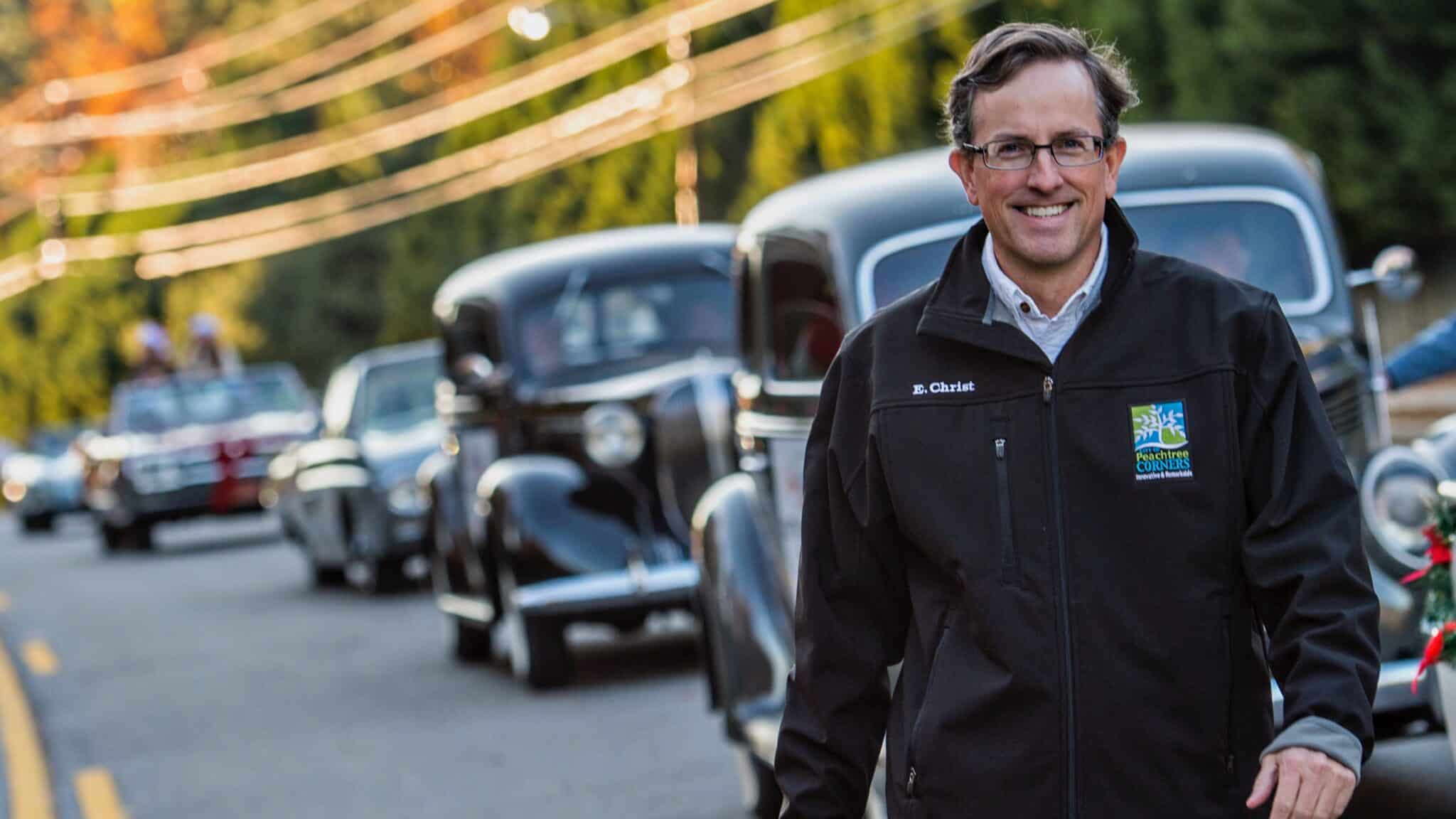
Source: Peachtree Corners Post 2 Councilmember Eric Christ’s recent newsletter.
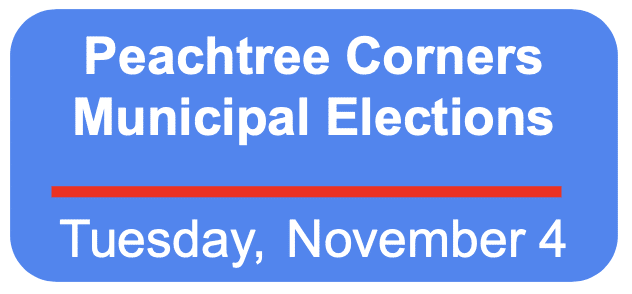
On Tuesday, November 4, we will have municipal elections here in the City of Peachtree Corners for three council seats. [And] for the first time since 2013, there will be a state-wide election on the same day as our city general election.
The state-wide election is to fill two seats on the Public Service Commission, which regulates Georgia Power and other utilities.
For the PSC election, the Gwinnett County Board of Elections will have all 156 county precincts open on November 4. Historically, Peachtree Corners has had a single voting location for city elections — at City Hall.
If we do the same this year, citizens who want to vote in both the PSC and the City Council elections will need to go to two places to cast their ballots.
A few years ago, I convinced the County Board of Elections to remove their prohibition against the Gwinnett Elections Department managing city elections. (Every county surrounding Gwinnett already offered this service to their cities.)
This means there is the potential of adding our city council elections to the county ballot.
I would like to hear your thoughts on the pros and cons of combining our city council races with the county’s for this year’s elections.
Please complete my brief survey by clicking here.

To sign up for Councilmember Christ’s newsletter or find him on social media, visit linktr.ee/votechrist.
You can read more from his latest newsletter updates here and here.
Related
City Government
City of Peachtree Corners Receives Distinguished Budget Presentation Award
Published
2 months agoon
January 31, 2025
For the eighth year in a row, the City of Peachtree Corners has been esteemed with the Distinguished Budget Presentation Award. This award was presented by the Georgia Finance Officers Association (GFOA) for the City’s Fiscal Year 2025 budget submission.
The award represents a significant achievement by the entity. It reflects the commitment of the governing body and staff to meeting the highest principles of governmental budgeting. To receive the budget award, the entity had to satisfy nationally recognized guidelines for effective budget presentation. These guidelines are designed to assess how well an entity’s budget serves as a:
- policy document
- financial plan
- operations guide
- communications device
Budget documents must be rated “proficient” in all four categories and in the fourteen mandatory criteria within those categories to receive the award.
Certificate of Recognition
When a Distinguished Budget Presentation Award is granted to an entity, a Certificate of Recognition for Budget Presentation is also presented to the individual(s) or department designated as being primarily responsible for having achieved the award.
“Congratulations to the entire finance team on receiving this award,” said City Manager Brian Johnson.
“This recognition is a testament to our team’s hard work, professionalism and commitment to excellence.”
There are over 1,700 participants in the Budget Awards Program. The most recent Budget Award recipients, along with their corresponding budget documents, are posted quarterly on GFOA’s website.
Award recipients have pioneered efforts to improve the quality of budgeting and provide an excellent example for other governments throughout North America.
About the GFOA
The Government Finance Officers Association (GFOA) advances excellence in government finance by providing best practices, professional development, resources and practical research for more than 21,000 members and the communities they serve.
About the City of Peachtree Corners, Georgia
As the heart of what is being called #SiliconOrchard in the metro Atlanta region, Peachtree Corners is a vibrant municipality that’s home to more than 45,000 residents and an innovation hub that houses some of the world’s most disruptive technology companies.
As the United States’ premier smart city powered by real-world connected infrastructure and 5G, Peachtree Corners serves as the model for how government and private industry can better collaborate to create a better future for society and business.
From the world’s first deployment of teleoperated e-scooters to fully autonomous shuttles being utilized by actual residents, and from a solar roadway to the largest electric vehicle charging hub in the region, Peachtree Corners is where the most future-forward Internet of Things (IoT) and sustainable technologies come to life for the benefit of its people and the world.
For more information, visit peachtreecornersga.gov.
Related
City Government
BRACK: How one city operates without property tax
Published
2 months agoon
January 30, 2025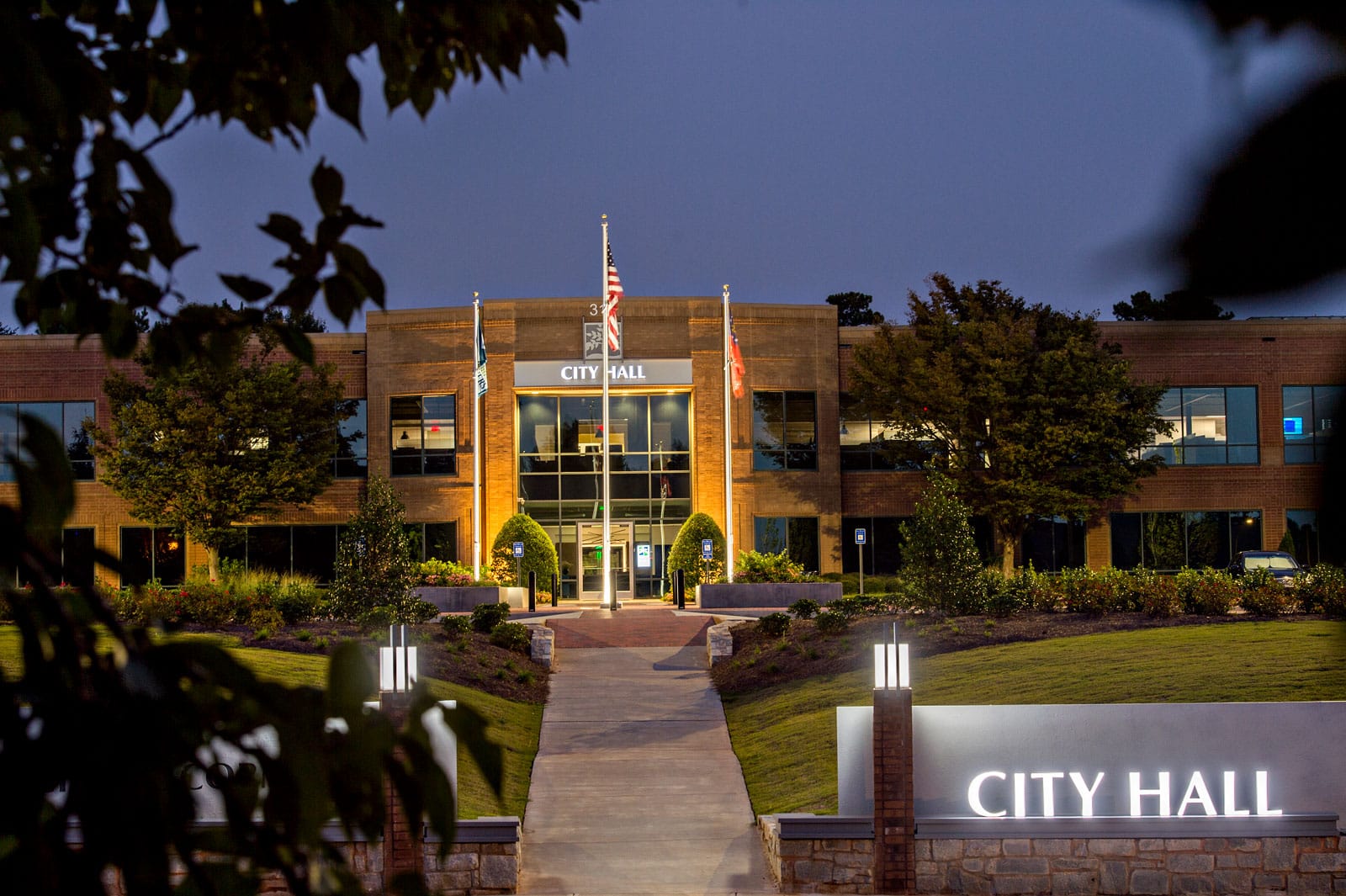
Some people lament paying taxes. They don’t understand that taxes allow us to live in a more civilized manner, helping and protecting us all along. That’s why I don’t mind paying reasonable taxes for the safety of everyday living.
Many don’t recognize it, but you are often paying a small tax without realizing it as you go about your everyday business….but it’s not called a tax.
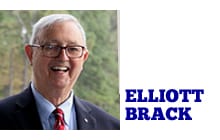
It’s called a “fee.” Each time you pay your power or utility bill and cable bill, your insurance premium, when you rent a hotel room or car…and other ways…you are providing a few cents or dollars to help fund mostly local government.
The newly-minted City of Mulberry (and previously Peachtree Corners) will run its government without taxing property owners paying a tax to fund its operations. How so? Entirely from fees.
Let’s visit what the other city without property taxes, Peachtree Corners, is doing.
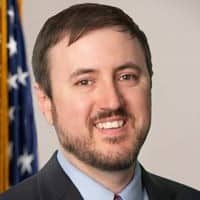
We talked with Cory Salley, who is the finance director for Peachtree Corners. He sent along a graphic which shows where Peachtree Corners gets its funding, as well as how it is spent. (See graphic.)
For the most part, Peachtree Corners is funded by fees. The biggest comes from Georgia Power Company, paying $2.8 million in fees for the city for 2025. Other utilities include $450,000 from Atlanta Gas Light Company; $250,000 from Comcast; $70,000 from Direct TV; and $42,000 from AT&T. (That last figure was interesting, in effect, showing how few people have land-line telephones anymore.) Altogether, utility fees brought in $4.3 million in Peachtree Corners for 2024.
Another bucket of fees include $3.8 million in insurance fees. This comes in one check from the Department of Revenue, which collects insurance fees for all cities.
Each business in Peachtree Corners pays an occupational business license tax. With lots of professional offices in the city, these businesses contribute $4.4 million to the city coffers.
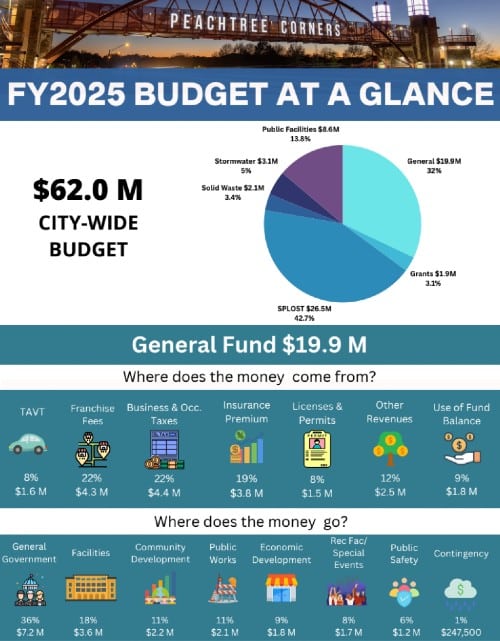
Other fee collections for 2024:
- Alcoholic licenses and sales: $1 million.
- Zoning and land development permits: $1.4 million.
- SPLOST funds on sales within Peachtree Corners: $10 million.
- Automobile and vehicle purchases: $1.7 million. This is interesting: no matter where you buy an automobile in Georgia, part of the sales tax reverts to the city where you live.
Then there are other funds coming to the city; stormwater fees, grants, solid waste, etc. Altogether, it added up to approximately a $40 million income to run the city.
Some specifics and the way they are figured:
- Real estate transfer taxes: This tax is imposed at the rate of $1 on the first $1,000 and 10 cents on each additional $10 on any conveyance of real property when the value of the interest transferred exceeds $100.
- Distilled Spirits—up to 22 cents per liter on package sales and up to 3 percent of the sale price of a drink on sales to the public;
- Wine—up to 22 cents per liter; and
- Malt Beverages—up to $6.00 per bulk container (no more than 15.5 gallons) to be paid by the wholesaler and up to 5 cents per 12 ounces when sold in bottles, cans or other containers.
- A municipality may levy a business license tax on depository financial institutions (such as a bank.) The maximum rate of this tax is 0.25 percent.
- Hotel-motel tax: a municipality may levy a hotel-motel tax at a rate of 3 percent or less or at a rate of 5, 6, 7, or 8 percent. (Yes, let the out-of-towner pay!)
Perhaps this gives you an idea of how a city, like Mulberry in the future, can operate without property taxes.
Have a comment? Send to: elliott@elliottbrack
Written by Elliott Brack
This material is presented with permission from Elliott Brack’s GwinnettForum, an online site published Tuesdays and Fridays. To become better informed about Gwinnett, subscribe (at no cost) at GwinnettForum.
Related
Read the Digital Edition
Subscribe
Keep Up With Peachtree Corners News
Join our mailing list to receive the latest news and updates from our team.
You have Successfully Subscribed!

Upcoming Spring Events You Won’t Want to Miss in April

Why Patient Experience Matters: A Conversation with Dr. Aristo Shyn

Burn The Ships: Alex Wright on Committing to Success & Helping Businesses Thrive

Expanding Horizons: How KGM Technologies Balances Defense, Medical, and Precision Manufacturing

Fun for a Good Cause at Curiosity Lab’s Inaugural 5K Run/Walk

Mike Schleifer to Leave Alliance for Lincoln Center Theater

Public Notice: Scheduled Maintenance on Town Center Parking Deck

Inside the Solicitor General’s Office: Lisamarie Bristol on Justice in Gwinnett County

Expanding Horizons: How KGM Technologies Balances Defense, Medical, and Precision Manufacturing

Mike Schleifer to Leave Alliance for Lincoln Center Theater

Public Notice: Scheduled Maintenance on Town Center Parking Deck

Inside the Solicitor General’s Office: Lisamarie Bristol on Justice in Gwinnett County

Why Patient Experience Matters: A Conversation with Dr. Aristo Shyn

Burn The Ships: Alex Wright on Committing to Success & Helping Businesses Thrive

Fun for a Good Cause at Curiosity Lab’s Inaugural 5K Run/Walk

Upcoming Spring Events You Won’t Want to Miss in April

Light up the Corners [Video]

Capitalist Sage: Business Leadership in Your Community [Podcast]

Cliff Bramble: A Culinary Adventure through Italy

Top 10 Brunch Places in Gwinnett County

A Hunger for Hospitality

THE CORNERS EPISODE 3 – BLAXICAN PART 1

Top 10 Indoor Things To Do This Winter

The ED Hour: What it takes to Remove Barriers from Education




